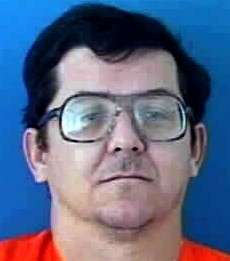Robert Glock was executed by the State of Florida for the murder of Sharilyn Ritchie
According to court documents Robert Glock and Carl Puiatti would force Sharilyn Ritchie at gunpoint to drive to a bank where she made a large withdrawal. Sharilyn was then driven to a remote location where she would be shot and killed
Robert Glock and Carl Puiatti would be arrested, convicted and sentenced to death
Carl Puiatti remains on Florida death row as of 2023
Robert Glock would be executed on January 11 2001 by lethal injection
Robert Glock Photos

Carl Puiatti Photos

Robert Glock FAQ
When Was Robert Glock Executed
Robert Glock was executed on January 11 2001
Where Is Carl Puiatti Now
Carl Puiatti is incarcerated at Union Correctional Institution
Robert Glock Case
Sharilyn Ritchie died clutching her husband’s baseball glove, the only comfort she could find in her final moments. She had pleaded for it before the two men who kidnapped her from DeSoto Square Mall in Bradenton took her car and left her in an orange grove. One of her killers, Robert Dewey Glock, died Thursday strapped to a gurney, a lone tube stuck in his right arm. More than 17 years after kidnapping Ritchie from the mall in broad daylight and sending a community into shock, Glock was pronounced dead at Florida State Prison at 6:28 p.m. The state’s first execution of 2001, a series of eight deadly injections, took 13 minutes. The first intravenous injections, administered at 6:15 p.m., contained sodium pentothal, a sedative used to relax the human nervous system. The second series contained pancuronium bromide, a chemical used to stop breathing. And finally, Glock received a fatal dose of potassium chloride, stopping his heart. Glock gasped and his chin quivered for a few seconds after the procedure began; then his body went still. He declined to take a shot of Valium.
Glock is the 51st inmate executed since the state resumed executions in 1979. In a three-minute statement before dying, an often tearful Glock expressed remorse for his crime and denounced the death penalty. “I killed Mrs. Ritchie,” he said. “I’m sorry for it.” Later, he said, “I believe that killing to prove that killing is wrong, is wrong.” With that, he expressed his love for his family and told witnesses in between deep breaths that he was “ready to go see Jesus.”
Ritchie, who taught at Palmetto High School in Manatee County, was kidnapped at gunpoint Aug. 13, 1983. Glock, 39, and Carl Puiatti, 38, who is on death row, stole her wedding ring and forced her to withdraw $100 from a bank. They then drove her in her car 60 miles north to Pasco County. They released her in an orange grove near Dade City, handing her a sun visor, her purse and her husband’s baseball mitt. They started to drive away, then decided to kill her. They shot her, came back and shot her again. She managed to walk about 10 yards before collapsing for the last time. Five days later, the two men were stopped by a New Jersey state trooper. They confessed to the murder and in 1984 Circuit Judge Wayne Cobb sentenced them to death.
Glock’s latest round of appeals brought the case back in front of Cobb, a judge known for his candor. Glock’s attorney, Terri Backhus, argued that her client was the victim of racial profiling when Glock was stopped by a New Jersey state trooper four days after the murder. On Jan. 5, the Florida Supreme Court disagreed. And in recent days, so, too, did the federal 11th Circuit Court of Appeals. At 11:30 a.m. Thursday, the U.S. Supreme Court followed suit.
At the same time, Robert Glock was finishing a last meal of New York strip steak and fried shrimp. It was accompanied by french fries, green beans and Coca-Cola and followed by a bowl of heavenly hash ice cream. He ate it early to avoid complications with the execution and, for security reasons, he used a plastic spoon. In prison, Glock found religion and love. In September, he married a woman he met through an Internet matching service used to start letter-writing exchanges with death row inmates. Thursday morning, she, two of Glock’s half-sisters and two of their daughters paid their last respects before the prison chaplain offered communion. “My husband had a tremendous amount of faith,” said Sheila Glock, who traveled from Gary, Ind., with her family. “He has been sorry for Mrs. Ritchie’s death for all these years. If it could have been him, he would have given his life.” More than 17 years later, he did just that. “When they do these executions, they have to realize that there are families,” she said while standing outside the prison, where she and about two dozen protesters lit candles, sang and prayed as the state administered its death sentence. “My husband did something bad, but so did they.”
In Palmetto, Ritchie’s father, Kermit Johnson, paraphrased President Franklin D. Roosevelt’s radio address after Pearl Harbor was bombed to describe the day his daughter was killed. “August 13, 1983, for our family, is a day that will live in infamy just as December 7, 1941, did for our nation,” he said. “We were devastated that day. And after court actions, judicial renderings and multiple appeals, we are still devastated.” Johnson said he would find no solace in Glock’s execution. It would not make up for the loss of his “dearest miracle.” Puiatti is still waiting on death row, more than 16 years after being sentenced. “That only solves 50 percent of the problem,” Johnson said after Thursday’s execution.







